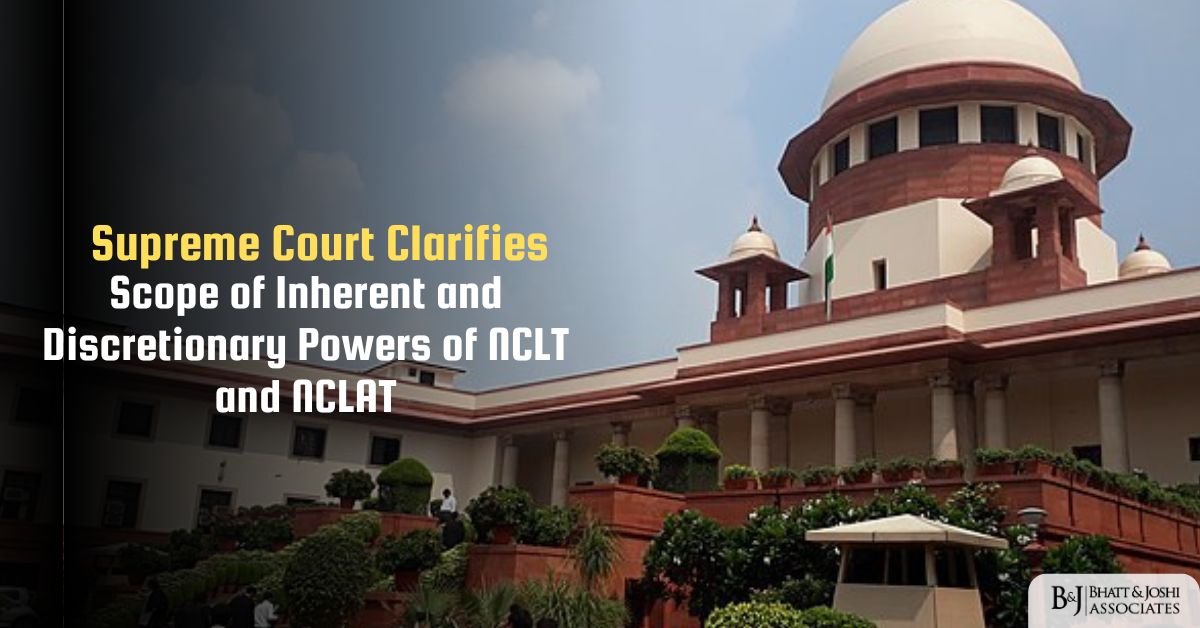Supreme Court Clarifies Scope of Inherent and Discretionary Powers of NCLT and NCLAT
 Introduction
Introduction
In recent landmark judgments, the Supreme Court of India has delineated the boundaries within which the National Company Law Tribunal (NCLT) and the National Company Law Appellate Tribunal (NCLAT) may exercise their inherent and discretionary powers. These rulings emphasize adherence to statutory procedures under the Insolvency and Bankruptcy Code (IBC), 2016, while acknowledging the necessity for flexibility in exceptional circumstances.
Inherent Powers: Defined and Delimited
In GLAS Trust Company LLC v. Byju Raveendran & Ors., the Supreme Court addressed the exercise of inherent powers by quasi-judicial bodies like the NCLT and NCLAT. The Court held that inherent powers are supplementary and should be invoked only when no specific provision exists within the legal framework. Importantly, these powers cannot contravene or override explicit statutory provisions.
The Court stated:
“Inherent powers may be exercised in cases where there is no express provision under the legal framework. However, such powers cannot be exercised in contravention of, conflict with or in ignorance of express provisions of law.”
This judgment underscores that while inherent powers are vital for addressing unforeseen situations, they must not be used to bypass established legal procedures.
Discretionary Powers: Exercising Judicial Prudence
The Supreme Court further elaborated on the exercise of discretionary powers in State Bank of India & Ors. v. The Consortium of Mr. Murari Lal Jalan & Mr. Florian Fritsch & Anr. The Court emphasized that discretionary powers, such as extending timelines under an approved Resolution Plan, must be exercised judiciously.
The Court observed:
“Such discretionary power must not be exercised mechanically without any application of mind. An extension on the strict timelines fixed under the resolution plan must be done by adequately weighing the period of extension sought with the consequences of such extension on the continued implementation of the Resolution Plan.”
The Court cautioned that unwarranted extensions could undermine the economic feasibility of the Resolution Plan and adversely affect the revival of the corporate debtor. Therefore, tribunals must carefully assess the necessity and impact of any extensions, particularly in sectors where timely resolution is critical.
Rule 15 of NCLT and NCLAT Rules, 2016: Scope and Application
Rule 15 of both the NCLT and NCLAT Rules, 2016, grants these tribunals the authority to extend time limits set by their rules or orders. The rule states:
“The Tribunal may extend the time appointed by these rules or fixed by any order, for doing any act or taking any proceeding, upon such terms, if any, as the justice of the case may require.”
While this provision allows for flexibility, the Supreme Court has clarified that such discretion should not be exercised arbitrarily. Extensions should be granted only when justified by the circumstances and should not compromise the objectives of the IBC.
Balancing Flexibility with Adherence to Statutory Provisions
The Supreme Court’s judgments highlight the need for a balanced approach in exercising inherent and discretionary powers. Tribunals must adhere to statutory procedures and timelines to ensure the efficacy of the insolvency resolution process. However, in exceptional circumstances, where strict adherence to procedure may hinder justice or the objectives of the IBC, tribunals may exercise their inherent powers, provided such actions are well-justified and do not conflict with express legal provisions.
Conclusion
The Supreme Court’s recent rulings provide crucial guidance on the exercise of inherent and discretionary powers by the NCLT and NCLAT. These judgments reinforce the importance of adhering to statutory procedures while allowing for necessary flexibility in exceptional cases. Tribunals are thus encouraged to exercise their powers judiciously, ensuring that any deviation from prescribed procedures is justified, transparent, and aligned with the overarching objectives of the IBC.
 Whatsapp
Whatsapp


